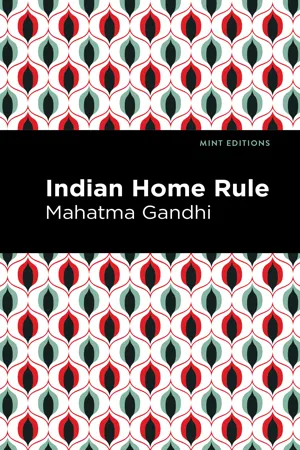
- 88 pages
- English
- ePUB (mobile friendly)
- Available on iOS & Android
Indian Home Rule
About this book
Indian Home Rule (1909) is a book by Mahatma Gandhi. Originally written in Gujarati while the author was traveling from London to South Africa, Indian Home Rule or Hind Swaraj is a groundbreaking text that laid out some of Gandhi's core beliefs as an activist and political thinker. Banned in 1910 by the British government in India as a seditious text, Indian Home Rule remains essential to Gandhi's legacy in his native country and around the world. "It is my deliberate opinion that India is being ground down, not under the English heel, but under that of modern civilization. It is groaning under the monster's terrible weight. There is yet time to escape it, but every day makes it more and more difficult." In Indian Home Rule, styled as a conversation between a Reader and an Editor, Gandhi makes his case for Indian independence or Swaraj, explains his concept of Swadeshi (self-reliance), and argues that the Indian people have it within their power to not only expel the British, but to govern themselves while remaining true to their cultural and religious traditions. Through his rejection of Western civilization and advocacy for nonviolent resistance, Gandhi laid the foundation for the vital work he would undertake upon returning to India in 1915. This edition of Mahatma Gandhi's Indian Home Rule is a classic of Indian literature reimagined for modern readers.
Since our inception in 2020, Mint Editions has kept sustainability and innovation at the forefront of our mission. Each and every Mint Edition title gets a fresh, professionally typeset manuscript and a dazzling new cover, all while maintaining the integrity of the original book.
With thousands of titles in our collection, we aim to spotlight diverse public domain works to help them find modern audiences. Mint Editions celebrates a breadth of literary works, curated from both canonical and overlooked classics from writers around the globe.
Tools to learn more effectively

Saving Books

Keyword Search

Annotating Text

Listen to it instead
Information
Table of contents
- Cover
- Title Page
- Copyright
- Contents
- Foreword
- Hind Swaraj Or The Indian Home Rule
- I. The Congress and its Officials
- II. The Partition of Bengal
- III. Discontent and Unrest
- IV. What is Swaraj?
- V. The Condition of England
- VI. Civilization
- VII. Why was India Lost?
- VIII. The Condition of India
- IX. The Condition of India (continued): Railways
- X. The Condition of India (continued): The Hindus and the Mahomedans
- XI. The Condition of India (continued): Lawyers
- XII. The Condition of India (continued): Doctors
- XIII. What is true Civilization?
- XIV. How Can India Become Free?
- XV. Italy and India
- XVI. Brute-Force
- XVII. Passive Resistance
- XVIII. Education
- XIX. Machinery
- XX. Conclusion
- Appendices
- A Note About the Author
- A Note from the Publisher
Frequently asked questions
- Essential is ideal for learners and professionals who enjoy exploring a wide range of subjects. Access the Essential Library with 800,000+ trusted titles and best-sellers across business, personal growth, and the humanities. Includes unlimited reading time and Standard Read Aloud voice.
- Complete: Perfect for advanced learners and researchers needing full, unrestricted access. Unlock 1.4M+ books across hundreds of subjects, including academic and specialized titles. The Complete Plan also includes advanced features like Premium Read Aloud and Research Assistant.
Please note we cannot support devices running on iOS 13 and Android 7 or earlier. Learn more about using the app